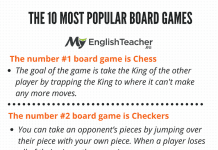
Exciting Games to Engage Your ESL Students
Teaching about all the different parts of speech and rules of English grammar is very important if you want your students to improve their language skills, but there comes a time when their brains need a break from all the information they are absorbing. It is also vital to help the mind relax in between study periods for better concentration. Find suitable slots within your lessons to play a game with your students, so they can unwind and have a laugh.
Games aren’t just for children, they’re for all levels and ages, and are also a vital part of learning. This is because students tend to remember more when they are relaxed and enjoying the topic of discussion. Furthermore, they encourage the quiet students to get involved too!
Below is a collection of games that not only encourage social interaction, humorous behaviour but also learning through play.
Some of these games will encourage critical thinking and discussion, others provide opportunities for spontaneous interaction and fun challenges. Have a look to see which ones you could use in your classroom to make it more of a fun and enjoyable environment for learning!

1. Order of Importance
This is an enjoyable activity as it encourages students to analyse their options and think carefully about any decisions they make. If you have a small group then split the class into two groups, for larger classes do small groups of 3-5 students. You can even play this with an individual student, where you challenge them yourself.
Tell them they have to plan a trip to … this could be anywhere, make it more challenging each time using different places like the Amazon Rainforest, The Moon, the Sahara Desert, a wild jungle, an unexplored cave or going back in time to a specific place.
They can only take two-five items with them (depending on where you are sending them) and if they have more than three, they should list them in order of importance as well. Each student or group should take turns to explain what they would take with them and why.
The other groups or students should decide if they agree or if they want to challenge their decision. Generally, this could get very interesting if the teams have compiled completely different lists.
Also, you should let them take control of the discussion as to whose list is most appropriate for the destination. You, as the teacher, should in turn challenge their responses or ask questions to fuel the debate.
Remind them at the start that they need to consider personal safety, survival and a successful trip. They will have all the relevant equipment before departure but they should select which additional personal items will be most valuable for their journey. You can be flexible with what will be given as standard equipment, depending on where they are going.
For example:
if you send them to another inhabited planet, they will be supplied with a spaceship, astronaut crew, food and water supply as standard. They will need to decide which additional items they should take to ensure a successful trip.
More for you:
Travel, Holiday, Vacation Vocabulary and Dialogs in English
Family Relationships in English And Phrases About Family

2. Categories
This game is about refreshing their memory on English vocabulary. If you have a large group of students, split them into two teams and call forward one or two members from each team for a head-to-head challenge.
The teacher says a category and each side is given 5 seconds to list something within that group, then it is the other team’s turn. You continue this way until someone repeats something that has already been mentioned, or they fail to say something within 5 seconds.
The winning team is given a point then you change the players and continue with a different category. The students tend to get very loud and excited the longer you play – be warned!
Category ideas:
Countries, Nationalities, Languages, Cities – worldwide, Cities – country specific, Islands, Food, Chain Restaurants, Fruits and Vegetables, Ice-cream Flavours, Drinks, Sports, Colours, Animals, Insects, Songs, Movies, Famous People, Brand Names, Items of Clothing, Jobs, Study Subjects, Electrical Appliances.
Things that can be seen in:
a kitchen, a restaurant, a living room, a bedroom, a bathroom, a garden, an airport, a school, a hospital, a gymnasium, a zoo, a farm.
More for you:
SHOPPING Phrases, Dialogs and Phrasal Verbs!
AT THE DOCTOR Dialogues and Vocabulary List

3. Chain Fairytales
This game focuses on storytelling and using imagination. You start a story by giving the first few words, such as ‘one day, there was a, ‘once upon a time’, ‘when I woke up’ or ‘there was once a’. Students should take turns to continue the story with their chosen words. Ensure they include different linking words and use the correct tense.
The teacher should also play, in order to guide the story in case the students seem to struggle. Working together to set the plot and invent the characters makes this a fun game for students of all levels.
I personally like to play this game at the start of class to get everyone hyped up, or in between study periods to help them wind down a little.
More for you:
List of Sentence Connectors in English with Examples!
6 Ways to Immediately Improve Your English Communication Skills

4. 20 Questions
Most of you may be familiar with this game but if you’re not, here’s how to play:
someone has to think of a word and the others try to find out what it is by asking the best questions. They must bear in mind that they can only ask 20 questions, and the person who has the word in mind, can only answer with ‘Yes’ or ‘No’.
For lower level groups, it may be advisable to appoint a topic and ask the student to choose a word that is somehow connected to that topic. For higher level students, they should be expected to plan and ask their questions carefully, as the topic could be anything!
You can choose to alter the rules if it seems too difficult for the students to guess the word. For example, you could let them ask as many questions they can until they get 20 ‘yes’ responses. Just be sure to guide them with their question planning, so they ask the questions in the most appropriate way to help them narrow down the clues. It also helps to keep a list of the clues as you go, to help them remember what has already been asked.
This is a fun and challenging game, it will help students to develop their question building skills (especially with word order and the use of auxiliary verbs). It will gear them to focus on being inquisitive and using their interrogative skills.
More for you:
How to Form Questions in English?
Best questions to ask to get to know someone!

5. Hot Seat
Break the class into 2 teams and place a chair at the front of the class facing the students (away from the board). Call up one student from the first team to sit on the hot seat. Firmly remind everyone in the class that they MUST NOT, under any circumstances, read aloud what you write, whisper to their friends, say the word in any language nor gesticulate to give it away. They are only allowed to use clues (that do not include the written word) to help their team member at the front guess what the word is.
Write a word on the board (in large letters) behind the hot seat. First the person’s own team can help them guess, give them a fixed time limit depending on their level (between 30 seconds and 2 minutes). If the person at the front cannot guess the word in the allotted time, then the other team gets to have a go for a bonus point. Then swap teams and start again. Ensure the person on the hot seat cannot see what you write on the board!
I generally deduct points for cheating, using their mother tongue or using their hands to describe the clues, otherwise it defeats the object! The aim is to get them thinking of synonyms, using descriptions and speaking in ENGLISH ONLY.
Also, don’t let the students say unfinished questions, as that is too easy (in my opinion)! For example, saying “to call your friend you use a …..” to help them guess the word ‘telephone’.
Here are some suggestions for words, but you can use anything you like for the appropriate level of your students, and what is relevant to their lives or studies:
chocolate, pineapple, helicopter, doctor, nurse, teacher, school uniform, hotel, passport, holiday, internet, laptop, computer, pizza, spoon, telephone, smartphone, newspaper, magazine, milkshake, airport, aeroplane, snacks, politician, prime minister, monarch, queen, king, children, parents, siblings, bandage, medication.
More for you:
Other Ways to Say You Are Welcome!
Other ways to say “Nice To Meet You”

6. Role Play
This is something that can be used in several different ways (be creative!) and can be tailored to suit all skill levels.
Write a list of situations on pieces of paper and mix them up in a bag or pot. Students go to the front in pairs or small groups, one at a time, and pick a scenario to act out. Now, you can decide whether you want them to use words, act silently or replace speech with ‘blah, blah, blah’, based on how you choose to play this.
Depending on how you play this, the audience (other students) can try to guess the situation (what is happening), the character’s names (famous people or a famous scene), where they are (another country, city or a local place) or what will happen next (predict the future). The first person to say the correct answer gains points for their team. I find it helps if you tell the students they won’t get points for shouting out the answers, that way it’s easier to monitor who got it right first!
Another way to play this, which works really well for students on an individual basis, is to use a situation based on what you have previously taught them and they have to overcome any problems that you present to them.
For example, if you are teaching English related to business, you could act as an important client who is disappointed about a business deal. The student has to remain professional and find a solution. At the same time, you should continue to present further problems for as long as you can. When you feel they have done well to resolve the issues, then you can reward points.
It makes it more fun when you switch roles, so the student gets to act as the client and present YOU with the problems, and you, as the business professional, try to find a solution. This could work with any topic or subject if you put your mind to it, such as English for law, economics, business, engineering, IT, finance or even general English.
More for you:
10 Cool ESL Games to Learn English On the Net and Mobile Device
Useful English Phrases For Running A Business Meeting

7. The Memory Game
This is a fun and quick game you can play to wake everyone up (if you feel like they might be losing concentration a bit!) and get them back on track. Use this as a swift break in between study periods.
You start by saying “For my holiday, I packed …” and point at the student who will follow first. They have to add an item to the list of things you packed for holiday. The students that follow have to say every item already on the list and add a new one too! Keep going until everyone in the class has had a go (or a few turns each if you only have a small group) and you feel they are more alert again!
If you are teaching on an individual basis, you could just play head-to-head with the student yourself! Personally, I love the chance to get involved and play the games myself too!
You could even change the scenario to anything you like, such as “I went shopping yesterday and bought …”, “I went to the viewpoint and saw …”, “as ransom for this cat, I want …” or “when I win the lottery, I will buy …”
More for you:
2 Amazing Tips To Memorize And To Remember English Words
112 Phrases for Saying Thank You in Any Situation
The possibilities are endless!
I would like to draw your attention to the fact that I have collected these activities over my past years of teaching. I collected them from various sources and they are not my own made up ideas, I simply tailored them to suit my students and my style of teaching.
If you have more ideas for games that we could add to this list, we would be delighted to hear from you in the comments box below!







![How To Teach English? Tools for English Teachers to Be Creative [Infographic]](https://www.myenglishteacher.eu/blog/wp-content/uploads/2013/06/how_to_teach_english_infographic-1-218x150.jpg)
















Hi Anastasia,
I really appreciate your efforts to come up with great lessons everyday. I set up the cookies to receive your daily lesson.
Furthermore, I have also enjoyed your lesson convering, ” used to “, “am used to” so I would like humbly to ask you if you can also cover a lesson on “supposed to” and “am supposed to”.
Thanks
Hi Fabrices!
Thank you for you kind words. Sure, would be happy to write about “supposed to”.
Are these answers cover your question? https://www.myenglishteacher.eu/ask/question/how-to-use-the-word-supposed-to/, https://www.myenglishteacher.eu/ask/question/be-supposed-tobe-to-verb/